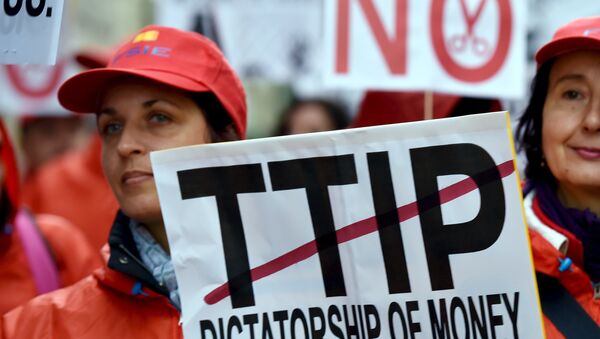"Civil society groups gave presentations to negotiators about their concerns regarding TTIP, however I'm not sure negotiators really heard our concerns. Instead of asking clarifying questions to really understand our concerns, they often challenged presenters and questioned the validity of what people said and gave vague promises that it is not their intention to harm the environment or weaken regulation of chemicals etc," FoE economic justice campaigner Jenny Bock said.
The main concern of environmentalists in relation to TTIP is that the deal could undermine environmental and public health regulations, as such rules are now considered as "trade barriers" that should be removed in order not to interfere with the business of multinational corporations.
If the regulations of toxic chemicals in the United States and the European Union is removed, rates of cancer and other chronic illnesses can increase, Bock explained.
"We have access to the negotiations in the sense that we were allowed to attend this time — in the final TPP negotiating round there was no stakeholder day — but the US Trade Representative is not listening," Bock continued.
At the same time, during the Q & A session chief US negotiator Dan Mullaney noted himself that there had to be deeper communication and information about the TTIP negotiating process.
"We cannot afford for life-altering policy decisions to be made behind closed doors, with industry lobbyists granted privileged access to negotiating documents while environmental advocates and the public are shut out," Bock said.
Negotiators at the secretive Transatlantic Trade and Investment Partnership (TTIP) talks have drafted the Sustainable Development chapter of the deal covering environmental and labor policies, but its details have not yet been fixed, a US NGO economic justice campaigner said.
On Friday, the week-long 11th round of TTIP talks is expected to wrap up in Miami, Florida. The negotiators are supposed to finalize the precise wording of the agreement. Several civil society and environmentalist groups, including Friends of the Earth (FoE), joined the trade summit in Miami to address the negotiators and voice their concerns over the deal.
"During the Question and Answer debrief session with US chief negotiator Dan Mullaney and EU chief negotiator Ignacio Garcia Bercero that was held as a wrap up to the stakeholder presentations, Mr. Bercero mentioned that the EU Commission had drafted a Sustainable Development chapter that would include environmental and labor policies," FoE economic justice campaigner Jenny Bock said.
Bock explained that one of the stakeholders at the session asked specifically whether sustainability was on the agenda at this round of TTIP talks.
"Mr. Bercero said the Sustainable Development chapter was being reviewed during this negotiating round but that it was still in proposal form and was not ready to be released to the public for review," Bock continued.
The main concern of environmentalists in relation to TTIP is that the deal could undermine environmental and public health regulations, as such rules are now considered as "trade barriers" that should be removed in order not to interfere with the business of multinational corporations.
If the regulation of toxic chemicals, specifically bee-killing pesticides, in the United States and the European Union is removed, rates of cancer and other chronic illnesses can increase, Bock explained.
The hotly-debated TTIP agreement seeks to deregulate trade between the United States and Europe and create the world's largest trade zone, encompassing over 60 percent of global production.


